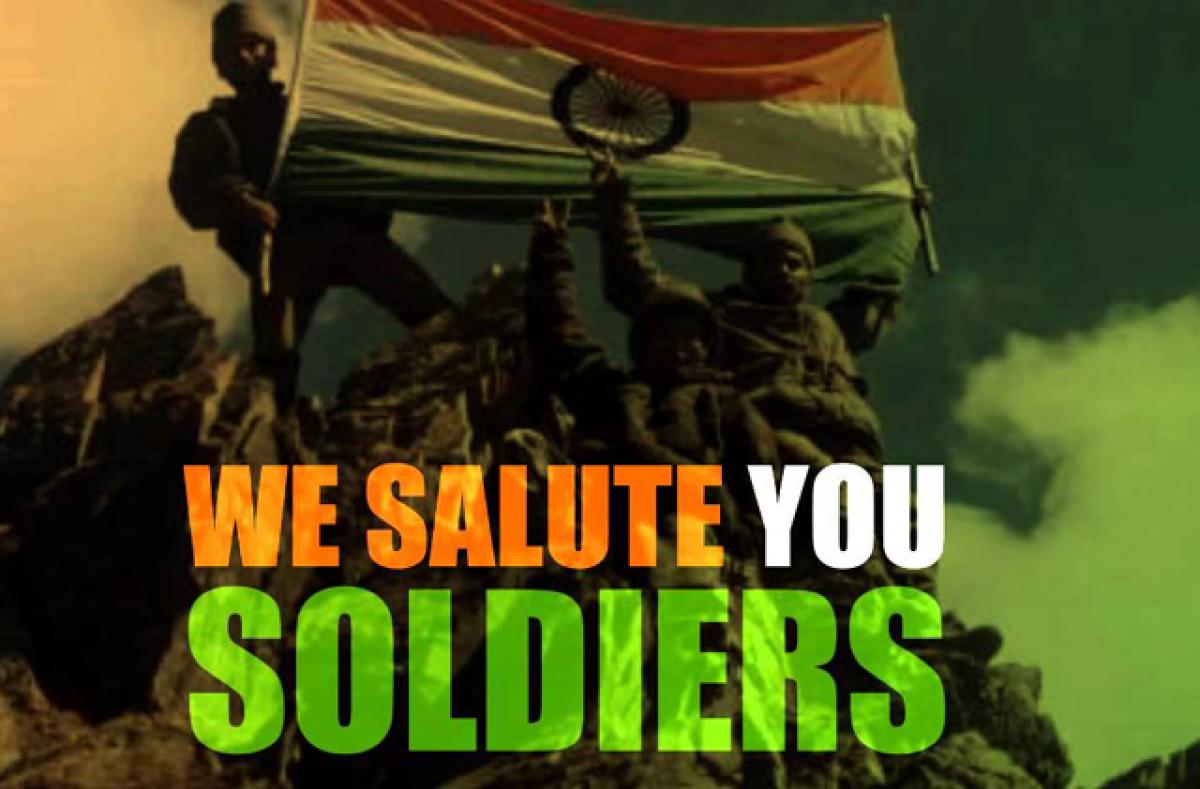Live
- Mamata doesn't want INDIA bloc to succeed, claims BJP's Rahul Sinha
- Air India Express cancels flights at Chennai airport due to deluge
- Kejriwal promises Rs 2,100 for Delhi women if AAP wins polls, BJP takes ‘lollipop’ jibe
- JPC Chairman supports Assam govt's 'No NRC, No Aadhaar,' rule
- Stoinis vows to revive Melbourne Stars’ glory with fresh leadership
- DDA easing freehold conversion of shops: MoS Sahu
- CP Sudheer Babu Updates on Manchu Family Cases
- Keerthy Suresh Marries Long-time Friend Antony Thattil in Goa
- Siddaramaiah govt defends police action on Panchamasali Lingayat protesters
- India fined for slow over-rate in second WODI against Australia
Just In

Politicising military is a strategic blunder. India\'s armed forces, apart from their role of safeguarding the nation, provide a bright strand in the national fabric, which represents the ideals of integrity, discipline, secularism and professional excellence.
India's armed forces, apart from their role of safeguarding the nation, provide a bright strand in the national fabric, which represents the ideals of integrity, discipline, secularism and professional excellence. Since independence, they have embodied a proud pan-Indian martial tradition that promotes a sense of national unity and cohesion.

In a region full of praetorian militaries, the Indian armed forces have remained scrupulously apolitical and a staunch pillar of democracy. Above all, they have come to the rescue when all other agencies have failed the Indian state. Like those who take up government service or political office, the serviceman, too, swears an oath to the constitution of India.
But, unlike them, the soldier bears an 'unlimited liability' for defence of the nation. His oath of allegiance includes this commitment: "I will obey all commands of the president of India .....even to the peril of my life." It is for this reason that the soldier is given a special place in society. However, this year's Kargil Vijay Diwas, meant to celebrate the victory of Indian armed forces over Pakistani intruders and to honour those who fell in battle, left a bitter taste in every soldier's mouth.
While politicians paid saccharine tributes to our fallen Kargil heroes, veterans - many in their 80s - were into the fifth week of a public agitation, asking the NDA government to redeem its promise of granting 'one rank one pension' or OROP. It was government inaction on the 6th Pay Commission anomalies that first drove the veterans on the streets in 2008.
Political indifference was compounded by the hostile approach of MoD (ministry of defence) bureaucracy in handling problems related to pensions and allowances of aging veterans, war widows and battle casualties. Forced to go to the courts, they were stunned to find a litigious MoD fighting them at every step through appeals.
In a bizarre development, the MoD perversely refused to implement even Supreme Court judgments favourable to the veterans. This was what eventually forced a disciplined and politically-neutral segment of society into the maw of party-politics. Narendra Modi’s allocation of cabinet portfolios to freshly retired military officers - a move of questionable wisdom - seemed to bear out the veterans' optimism.
A year later, however, the disillusioned veterans are seeking alternative political options. Once he doffs his uniform, a veteran is, technically, liberated from the restraints of military discipline and is free to adopt the demeanor of an ordinary civilian. But deep inside, his soul cringes at the very thought of conducting himself in a manner which would have brought disrepute to his uniform, unit or Service.
Public agitations and undertaking fasts and dharnas are activities he instinctively associates with trade unionism. In an inexplicable and self-destructive continuum, governments have deliberately proceeded to downgrade and demoralize their own armed forces and veterans.
A savvy political leadership should have seen through this ploy and realized that: (a) soldiers and veterans are emblematic of a nation's pride and honour and need to be protected from such internal assaults, (b) demoralization of the military erodes national security and benefits the nation's enemies, and (c) allowing politicization of the military is a strategic blunder that will have long-term consequences.
It is appalling to think that, from 2008 onwards, no political leader has had the good sense to visualize the damage that would be caused to India's security edifice by veterans taking to the streets and seeking political support. All this could have been nipped in the bud, very simply, by reaching out to the veterans, creating grievance redressal mechanisms and establishing direct communication with them.
Irresponsible and intemperate voices of the veterans are already being heard on the social media; some demanding that the three service chiefs should offer their resignations over the OROP issue. Worse suggestions may follow. Even at this late hour, a spark of statesmanship, sagacity and empathy for the Indian soldier can pull us back from the precipice.
Recognition of the sacrifices made in fulfilling the extraordinary demands of military service, articulated at the apex political level, and earliest accord of OROP would justify a quid-pro-quo demand for cessation of the veterans' agitation and their participation in politics. (The author is a former Indian Navy chief)
By Admiral (Retd) Arun Prakash

© 2024 Hyderabad Media House Limited/The Hans India. All rights reserved. Powered by hocalwire.com







